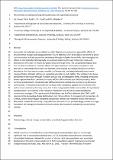Microclimate variability and long-term persistence of fragmented woodland
Abstract
Favourable microclimates are predicted to buffer fragmented populations against the effects of environmental change, but ecological timeseries are often too short to establish the extent to which such microsites facilitate population persistence through multiple climate shifts. We investigate the effects of microclimatic heterogeneity on woodland resilience through millennial climate and disturbance shifts near northwest European woodland range limits. We use palaeoecological data from northern Scotland to study the effects of fragmentation on community composition and diversity in a potentially favourable microclimate, and compare palynological timeseries of tree abundance from five sites to assess the effects of favourable (low-lying sheltered) versus more marginal (higher altitude) settings on population persistence and stability. The sheltered site shows persistence of tree cover through Holocene climatic and anthropogenic shifts, including climatically-driven regional woodland contraction around 4400 cal BP (calendar years before present), when surviving woods became compositionally differentiated into upland pine and low-lying deciduous communities. A favourable microclimate can thus buffer woodlands against environmental shifts and increase continuity of canopy cover, but it does not generate stable communities. Compositional reorganisation is an essential stress response mechanism and should be accommodated by conservation managers. The replacement of deciduous taxa by Pinus sylvestris after 1060 cal BP represents the decoupling of pine distribution from climate drivers by management intervention. As a result, current microrefugial woodland composition reflects late Holocene human intervention. Alternative models of community composition and behaviour from palaeoecology provide a stronger foundation for managing microsite communities than relict woods in contrasting environmental settings.
Citation
Davies , A L , Smith , M A , Froyd , C A & McCulloch , R D 2017 , ' Microclimate variability and long-term persistence of fragmented woodland ' , Biological Conservation , vol. 213 , no. Part A , pp. 95-105 . https://doi.org/10.1016/j.biocon.2017.06.006
Publication
Biological Conservation
Status
Peer reviewed
ISSN
0006-3207Type
Journal article
Description
This work was conducted with funding from The Woodland Trust.Collections
Items in the St Andrews Research Repository are protected by copyright, with all rights reserved, unless otherwise indicated.

